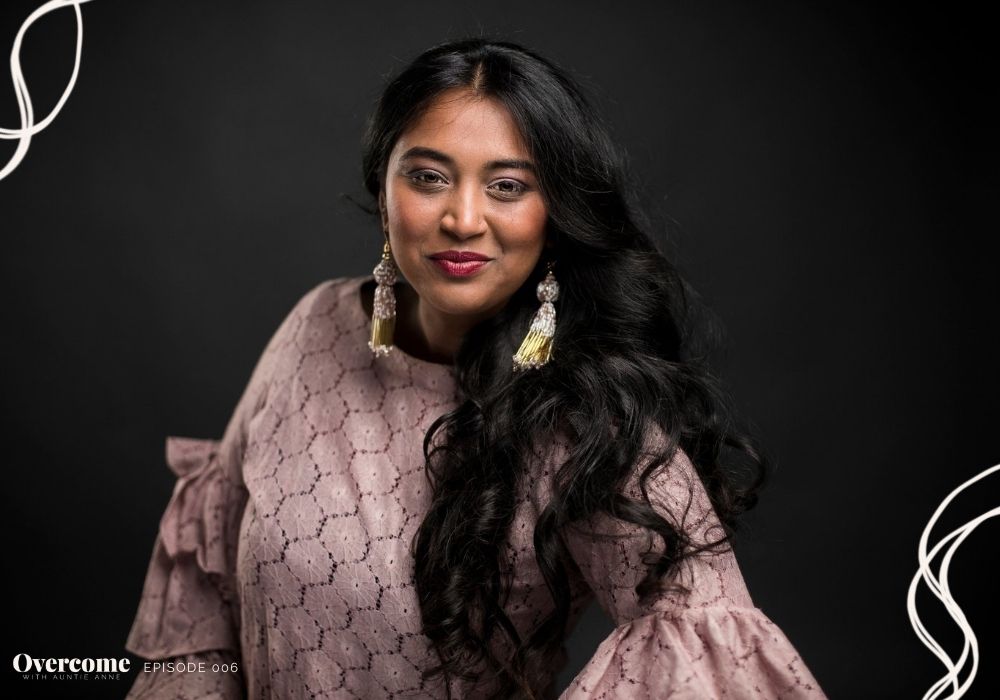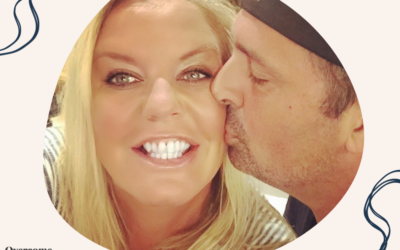When Timbrel Chyatee traveled from the United States back to her homeland of India with her family in February 2020, she was planning on being there for only a few weeks. But when the then unfamiliar Coronavirus hit and the world shut down, India went into lockdown. With no one allowed in or out, Timbrel was stuck, and she began to panic. But her panic was eventually overcome with a sense that God had her where she was for a reason, and she took the opportunity to make a difference in the lives of thousands of people.
This week on Overcome With Auntie Anne, I sit down with Timbrel Chyatee and talk to her about her experience as a first-generation Indian growing up in the United States and how that experience gave her a passion to empower women through fair wages, fashion, and positivity. Timbrel is the founder of Lush Bazaar, the creator of Cultured Workshops, and she’s from my hometown of Lancaster, Pennsylvania. Since meeting her, I’ve had the opportunity to watch her grow her business and reach amazing levels of success.
Listen to Timbrel’s entire story on the podcast or continue reading for some of the highlights.
Out of place in America
Timbrel was born in India, but she moved to the United States with her family when she was three months old. Back then, Lancaster County, Pennsylvania didn’t have the diversity it does today, and Timbrel and her brother were the only Indians in their school. Her third-grade teacher didn’t even know there were any Indians in Lancaster County and mistook her for a “Native American Indian.”
From a young age, Timbrel felt out of place—she wanted to hold onto to her Indian roots that she loved, but she also wanted to be a part of this new culture in the United States that she was now in. Life wasn’t always easy. She remembers bringing Indian rice and curry for lunch to school one day, and her classmate, whose locker was next to hers, told her not to bring her stinky food to school anymore because it was making his locker smell.
Mean comments like this one that her classmates would often make hurt, and Timbrel felt helpless. And because she didn’t want to burden her parents with anymore than they already had since they were also trying to figure out life in America, Timbrel felt alone. She started gliding through life, trying not to stand out.
Out of place in India
At twelve, Timbrel’s family moved back to India. Her parents were missionaries and wanted to serve the people they loved in their own country. But it was another culture shock for Timbrel. In the States she didn’t fit in because she was Indian. But now in India, she didn’t fit in because she was “the American.” She was dealing with the same things all over again.
It ended up being a growing experience, though, because during her time in India, Timbrel’s parents started telling her that she didn’t have to follow what other people did. She could be her own person. She has a voice that’s unique and beautiful. Those words stuck with Timbrel, and when they moved back to the United States when Timbrel was in 11th grade, she started coming out of her shell. The way she puts it is that her parents were inspiring her and teaching her that she can stick up for herself.
This inspiration is what really motivated her to break out of the box she had found herself in. There were so many little boxes from her bicultural life—dress this way, believe these things, be silent, etc.—that turned into one big box, shutting her in. But as a 24 year old, single woman now back in India after college, she began to find her voice and grow.
While she was looking for an apartment, it took her 29 tries before someone would rent her a place. But that taught her perseverance. And that perseverance made her stronger and more motivated to stay in India and figure life out there. And her faith grew too, from anger and frustration about what was happening to leaning on God and understanding that his purpose for Timbrel may be bigger than what she imagined.
Finding a place with her passion
All of this led her to her passion: serving people, loving people, and sharing with the world the beauty that her Indian culture and people have to offer. Eventually, Timbrel started her own clothing company called Lush Bazarre. She works with artisans and seamstresses in India—particularly women in India who need jobs—designing and making clothing that gets sold here in the States. The women she works with get paid a fair wage, work in safe environments, and have a much better work/life balance.
She recently started working with women in Colombia, too, doing the same thing. And the goal is to continue to expand to more and more countries. Timbrel combined her love for fashion and her passion to serve people to create a model where she helps and empowers women. And on top of that, she now knows and feels a part of the culture in India and is well respected.
Stuck in place during Covid
Things got thrown into a loop, though, when in February 2020, Timbrel took a trip to India with her family—the first time in ten years that they all went back together. After being there for a week, her father and siblings flew back to the states. But Timbrel stayed a while longer to do some work, and her mom stayed to be with family.
They both were in separate cities, and not long before she was supposed to fly home, Timbrel went and visited her mom. She was planning on staying only for a couple of days, but not long after getting there, India decided to shut down the country because of Covid-19, and Timbrel was stuck.
Although she was scared, there wasn’t anything she could do. So she took those 21 days to think about her life, to fast, pray, regroup, and refocus. Covid was still very new and unknown, and as the lockdown was about to end, India announced that it was going to be extended for another month. This is when Timbrel started to panic.
Not only did she have bills to pay in the States, she had her business and her staff who weren’t allowed to work because of Covid here. She wasn’t sure how she was going to get through this or what the outcome would be. Depression started to set in, and she felt overwhelmed and stuck. But it’s often in those moments of feeling stuck when God begins to work. And Timbrel started to sense that maybe there was a reason God had her where she was during this particular time.
Give what you have
Because of the lockdown, people in India could only leave their homes from 6am to 9am to go get groceries, medicine, and whatever else they needed. So Timbrel started waking up early just so she could go out and talk with these people. And what she found was that they were going hungry and had no way of feeding their families. A lot of people in India are day laborers—they work for a day’s wage and then use that money to feed their families that day. But because of the lockdown, many of these people couldn’t work, and they had no food.
Timbrel knew people needed help, so after convincing the Indian government that some of its people were starving and dying and would soon resort to stealing out of desperation, Timbrel started a food bank and gave food to these struggling families. She and others would work through the night to collect groceries and vegetables so they could be set up and ready to hand out during the 6am-9am window.
She was committed to keeping this food bank going until the lockdown was over, and she used her savings—savings set away to buy a house in the States—to keep it going until they ran out. But that didn’t stop her. She started contacting people on Facebook and asked them for help. And every week, the money was there when they needed it. When it was all over, Timbrel says they served 3,000-4,000 families during the lockdown.
I believe that God asks us to only give what we have, and that’s exactly what Timbrel did. But then God took what she gave and multiplied it just like the loaves and fishes, and thousands of people were helped because of Timbrel’s passion to serve people.
A new space in the States
In August of 2020, nearly six months after she was supposed to return, Timbrel finally made it back to the United States. But by the end of September, the effects of Covid took its toll, and she had to close down her business. It was only a 200 square foot shop, but it was her first store, her heart and soul as she says, and letting it go was painful. While she was packing up, she remembered a saying her dad had once told her—“Sometimes you have to be in the hallway to know what your next door is going to be”—and she thought, “Okay God, what’s next?”
Timbrel took some time off but was then contacted and told there might be a space available for her to reopen her shop. After seeing the space—which was 2000 square feet, ten times bigger than her old space—and taking a few weeks to figure out if and how she could make this happen, the owners just handed her the keys and told her they wanted her to have it.
When she showed her parents, they both started crying. For them, it was a sign that their immigrant daughter had made it. The little girl from India who didn’t fit in growing up in the States, and didn’t fit in after moving back to India, overcame all those obstacles and followed her passion.
Timbrel is continuing to run her business and helping women in the process. Her dream is to raise daughters that are persistent like she is and stronger than she is—to raise women who will change the world.
What I love about Timbrel is that she goes after what she wants. She sees a need and she figures out a way. She sees others struggling, and she gives out of what she has, whether it’s women in other countries who need jobs or families going hungry during a pandemic. She’s inspiring, and I’m honored to have talked with her.
If you want to learn more about Timbrel and what she’s doing, you can look her up on Facebook. You can see all that she’s doing in business and in the world.






